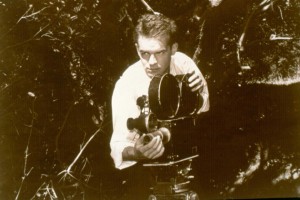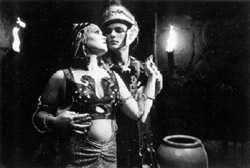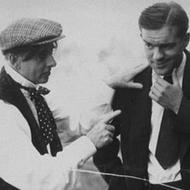Forgotten Silver
 Forgotten Silver is an extraordinary and sadly unappreciated document that reveals the career of the great unheralded New Zealand filmmaker Colin McKenzie. Co-directors Costa Botes and Peter Jackson, of Lord of the Rings and Heavenly Creatures fame, give us as yet untold history in their discovery of McKenzie, the creator of the first feature length motion picture, way before D.W. Griffith, the first experimenter with both color and sound, well before The Jazz Singer and even color tinting, and the documenter of a pre-Wright brothers flight, by New Zealand inventor Richard Pierce. Financed by New Zealand television for a series of historical documentaries, McKenzie’s story is both poignant and sad and filled with the kind of true to life elements of lost love, violence and war, political strife, and other struggles that make up the most fascinating and complicated real lives… If only McKenzie’s life were actually real.
Forgotten Silver is an extraordinary and sadly unappreciated document that reveals the career of the great unheralded New Zealand filmmaker Colin McKenzie. Co-directors Costa Botes and Peter Jackson, of Lord of the Rings and Heavenly Creatures fame, give us as yet untold history in their discovery of McKenzie, the creator of the first feature length motion picture, way before D.W. Griffith, the first experimenter with both color and sound, well before The Jazz Singer and even color tinting, and the documenter of a pre-Wright brothers flight, by New Zealand inventor Richard Pierce. Financed by New Zealand television for a series of historical documentaries, McKenzie’s story is both poignant and sad and filled with the kind of true to life elements of lost love, violence and war, political strife, and other struggles that make up the most fascinating and complicated real lives… If only McKenzie’s life were actually real.
Forgotten Silver is actually a big joke. Jackson and Botes play the entire 50 minute film completely straight and deadpan with no obvious clue that the whole enterprise is a sham. Those who thought that Lord of the Rings showed that Jackson lacked a sense of humor would probably be well suited to watch this marvelous fiction, they would buy it completely. When I first saw the film 5 years ago, I had already been a big fan of Jackson’s Dead Alive, The Frighteners, and Bad Taste, so I picked up the fraud about halfway through and continuously laughed to myself. The film is even more satisfying upon repeat viewing because of all of the little layers that you probably didn’t pick up on the first time. The recreations of old film footage combined with testimonials from some major film players (there’s a wonderful in-joke with Miramax president Harvey Weinstein) only add to the authenticity. The joke even continues to the end credits which present thank you’s to those at the New Zealand film commission who helped restore McKenzie’s 3 hour version of Salome. As Christine Baranski said in Bowfinger… “It was a beautiful lie.”
 Video:
Video:
The film is presented in non-anamorphic widescreen and the ratio looks about 1.66. It appears that the mockumentary was shot in 16mm, and the image fairs only slightly better than when I originally saw it on VHS. This does help with the recreated footage of McKenzie’s films, as they are supposed to look aged, but one would hope that there was a little effort in restoration since the extras were created specifically for the, so obviously the films wasn’t simply sitting around.
Audio:
The sound is presented in 2 channel stereo, entirely functional for a documentary of this type. Dialogue is clear and the effective musical score by Plan Nine is suitably presented. The only real audio problem is the fact that co-director Costa Botes’ commentary is difficult to hear because the movie is playing too loudly in the background as he talks and so it is distracting.
 Extras:
Extras:
Botes’ commentary is intermittently interesting. Occasionally he reveals a joke that you wouldn’t necessarily catch without his prompting, McKenzie’s Salome film cans are discovered in an Ark like structure that has a giant bull on it, in other words, the movie is a behind a lot of bull. The movie also starts with Jackson walking us “down the garden path.” We also learn that Leonard Maltin is a fantastic improviser, which is a surprise considering how little he impresses in his regular television appearances in the US. Apparently Quentin Tarantino was supposed to have appeared in the film, but Botes felt that not enough people had heard of him. Other times Botes simply tells us who had what idea, ad nauseam and tells us what emotions we were supposed to have. It was during these periods that I wished that Jackson had had more input on the disc, his one currently released commentary for the enormous box set laserdisc of “The Frighteners” brims with energy and enthusiasm, something that Botes languid talk sorely lacks. Might this have something to do with the fact that Jackson’s career has obviously flourished since “Forgotten Silver,” and Botes (who also produced the documentary on the disc) has scarcely been heard of?
Jackson’s energy is quite evident on the fantastic behind the scenes documentary “Behind the Bull,” which covers the making of the mockumentary and the aftermath of public reaction to the hoax. Jackson, Botes, and other contributors supply the stories of how the movie was made and the extremely humorous public uproar over being fooled. Wasn’t the public aware that at first people thought that Spinal Tap was a real band too?
The 8 minutes of deleted scenes on the disc are sort of a waste, despite Botes’ enthusiasm for them. They would have only made the joke of the movie more obvious.




Forgotten Silver – Fact or Fiction? (Critical Thinking) | eunicegmy says:
February 24th, 2013
12:22 pm
[…] http://regrettablesincerity.com/?p=1967 […]